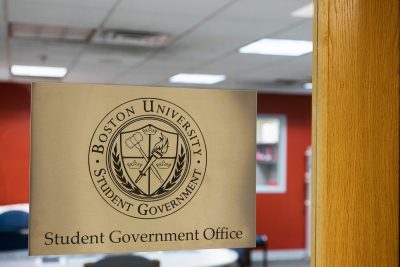
Boston University Student Government heard a presentation on TokenSpace, listened to cabinet updates and discussed potential amendments to a bill redefining the structure of StuGov in a meeting Monday night.
Anaya Barmecha, a junior in the School of Hospitality Administration, and Aashna Ranka, a senior in College of Arts and Sciences, presented to StuGov their NFT startup, TokenSpace. NFT stands for non-fungible token — a digital asset that represents real-world goods and is often purchased with cryptocurrency.
“We’re basically connecting creators and their audiences through experiential NFTs,” Barmecha said. “Influencers, global executives, people who already have a big following base … are able to actually put out experiences in the form of NFTs.”
Barmecha and Ranka said they were attempting to address the difficulty of establishing a presence in the NFT marketplace for creators and connecting to potential consumers on social media platforms.
TokenSpace has partnered with social media influencers and bloggers already, including Avanti Nagral, Natallia Aroraa, and Violet Witcher. Barmecha and Ranka said they were seeking partnerships with global executives next.
“We’re looking to really bring in mentorship with [global executives],” Barmecha said. “Especially students who are looking to have experiences, they want to learn and grow and advance their careers and opportunities.”
Ranka added that TokenSpace planned to partner with unknown artists as well to offer a space for their work to garner attention.
“We’re going to partner [consumers] with emerging artists who don’t already have a platform to actually visually represent their experience,” Ranka said. “It’s not an exploitation thing, but more a learning and mentorship opportunity for all.”
Ranka said that an example of this process in action would be the sale of an NFT to an industry professional in exchange for a 15-minute conversation in which the student could network and ask questions.
Some senators brought up that buying and selling mentorship to college students might further disadvantage lower-income students.
“It feels almost like the justification for providing the service is just because people will pay for it,” CAS sophomore and Senator Alex Brumfield noted.
The meeting continued with cabinet updates, some of which included plans for Spring-fest.
Director of environmental affairs and College of General Studies sophomore Saahithi Achanta outlined plans for Earth Day, taking place on April 22, the last day of the festival.
“One thing that we want to do is include outdoor activities to get people outside,” Achanta said.
She added that the Department of Environmental Affairs planned to collaborate with FEAST — a standing Senate committee dedicated to food equality, accountability, sustainability and transparency at BU — to offer vegan and vegetarian options specifically for the event.
Other events on the Spring-fest schedule include the spring formal — previously the winter formal that was postponed from Feb. 11 due to Omicron concerns — being held April 22 from 7:30 to 11:00 p.m. at the New England Aquarium.
The next item on the agenda was amendments to Bill 008, which senators discussed for nearly 40 minutes.
Amendments to Bill 008 were introduced Feb. 7 with the objective of amending the StuGov Constitution to clarify branch leadership, ensure branches are equally represented and organize all branch meetings.
The Rules Committee clarified that the bill does not give the judicial branch legislative power or branch leaders any say in the legislative process.
The original bill will be voted on next week.


















































































































